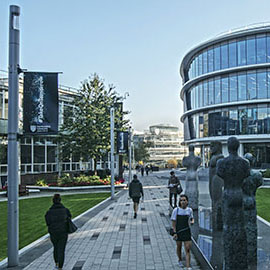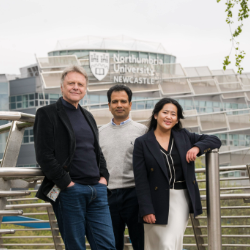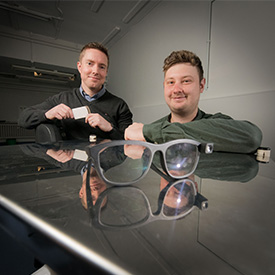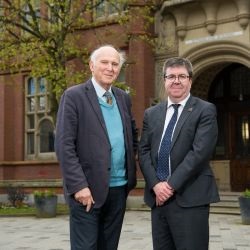-
Study
Study
Interested in studying at Northumbria? With 31,500 students, Northumbria is one of the largest universities in the country, offering courses on either a full-time, part-time or distance learning basis.
Discover more-
Undergraduate
- Undergraduate Study Degree
- Undergraduate Open Day & Events
- Application Guides
- Northumbria University UCAS Exhibitions
- Foundation Years
- Undergraduate Fees & Funding
- School & College Outreach
- Continuing Professional Development
-
Postgraduate
- Postgraduate Study Degree
- Postgraduate Research Degrees
- Postgraduate Open Days and Events
- Postgraduate Fees & Funding
- Flexible Learning
- Thinking about a Masters?
- Continuing Professional Development
- Change Direction
-
Student Life
- The Hub - Student Blog
- Accommodation
- Life in Newcastle
- Support for Students
- Careers
- Information for Parents
- Students' Union
- Northumbria Sport
-
-
International
International
Northumbria’s global footprint touches every continent across the world, through our global partnerships across 17 institutions in 10 countries, to our 277,000 strong alumni community and 150 recruitment partners – we prepare our students for the challenges of tomorrow. Discover more about how to join Northumbria’s global family or our partnerships.
Discover more-
Applying to Northumbria
- European Union
- Our London Campus
- Northumbria Pathway
- International Events
- Entry Requirements
- Agent Network
-
Northumbria Language Centre
- Faculty Requirements
- Acceptable English Requirements
- Pre-Sessional English and Study Skills
- Academic Language Skills Programmes (ALS)
-
International Fees, Funding & Scholarships
- International Undergraduate Fees
- International Undergraduate Funding
- International Masters Fees
- International Masters Funding
- International Postgraduate Research Fees
- International Postgraduate Research Funding
- International Money Matters
-
Life at Northumbria
- International student support
- The Hub - Student Blog
- Careers
-
International Mobility
- Current Northumbria Students
- Incoming Exchange Students
-
-
Business
Business
The world is changing faster than ever before. The future is there to be won by organisations who find ways to turn today's possibilities into tomorrows competitive edge. In a connected world, collaboration can be the key to success.
Discover more -
Research
Research
Northumbria is a research-rich, business-focused, professional university with a global reputation for academic quality. We conduct ground-breaking research that is responsive to the science & technology, health & well being, economic and social and arts & cultural needs for the communities
Discover more -
About Us
-
About Northumbria
- Our Strategy
- Our Staff
- Our Partners
- Student Profiles
- Alumni Profiles
- Leadership & Governance
- Academic Departments
- University Services
- History of Northumbria
- Contact us
- Online Shop
-
-
Alumni
Alumni
Northumbria University is renowned for the calibre of its business-ready graduates. Our alumni network has over 236,000 graduates based in 178 countries worldwide in a range of sectors, our alumni are making a real impact on the world.
Discover more - Work For Us
What will I learn on this module?
In this module you will learn about electronic communications. You will learn fundamental techniques that are used in communication systems for sending information between two devices. You will learn a number of techniques that are used in modern day communication systems to transfer information both via a physical connection such as a cable and also via a wireless connection.
Two of the key themes of electronic communications that you will study are Analogue communication and Digital communication. In both themes you will learn a number of key engineering processes that are fundamental to communications. In analogue communications you will learn the key physical and electronic processes necessary to transfer information in an analogue form. You will also explore current technologies and techniques in radio and satellite communications. In the digital communications topic, the knowledge that you learn in analogue communications will be expanded to a higher level to allow you to understand the key requirements for digital communication. We will examine how communication techniques have evolved over the years to allow users to transfer vast amounts of information at ever increasing speeds.
Three key areas within these two topics are identified:
ANALOGUE COMMUNICATION SYSTEMS
Amplitude Modulation; comparison of various forms of AM, demodulation, frequency and phase insertion errors, examples and applications. Frequency modulation; NBFM, WBFM, spectra and bandwidth, examples and applications. Transmission and reception circuits. Attenuation in radio systems. Modern systems and standards.
DIGITAL COMMUNICATION SYSTEMS
Spectra of rectangular waveforms, bit rates, baud rates and relationship to bandwidth. line codes and shaping. ASK, FSK, PSK, generation and demodulation, spectrum and bandwidth. Comparison of bandwidth and power. Quadrature carrier systems. OSI reference model. Asynchronous and synchronous communications. The serial data link. Protocols. FDM and TDM multiplexing. Parity and CRC principles and implementation. Networks. IP addressing
OPTICAL SYSTEMS
Optical sources; structure, performance and frequency response. Detectors. Fibres; modes, dispersion, optimum wavelength, coupling and splicing.
How will I learn on this module?
You will be learn via a combination of lectorials, laboratories, directed learning and independent learning. You will experience a number of computer simulation tools, such as MATLAB and microwave office programmes, which will be used to enhance your understanding of the lecture material. You will also be exposed to state of the art communication facilities. Before each lecture you will be expected and encouraged to read ahead by reviewing the support material provided via the eLP to support your own learning outside of timetabled hours.
Within lectures and seminars, practical examples and analysis will be explored, and you will be expected to actively participate in these sessions. Some of these sessions may involve tutor lead Q+A sessions and student to student explanation and response at the front of class.
In addition, you will be encouraged to research the subject through the directed learning, reading list and topic links. This will broaden your knowledge around the current theory, techniques and standards and the hence the future development in communications and enhance your experience for future employment.
How will I be supported academically on this module?
The module is delivered as noted in both lectorials and workshops. These provide the key academic support to the module; however around this a number of support structures are included.
Workshops, supported by lab tutors, effectively provide verbal feedback and comments throughout the session. Such comments may be generic and applicable to all students, typically noting procedures or some technical guideline or could be may be more directed to the individuals learning.
The most appropriate use of blackboard (online platform) is made in the module where the module taught content is provided along with links to the reading list. Online screen videos are included on the eLP platform to help students understanding of key concepts related to this module.
What will I be expected to read on this module?
All modules at Northumbria include a range of reading materials that students are expected to engage with. The reading list for this module can be found at: http://readinglists.northumbria.ac.uk
(Reading List service online guide for academic staff this containing contact details for the Reading List team – http://library.northumbria.ac.uk/readinglists)
What will I be expected to achieve?
Knowledge & Understanding:
• Apply knowledge of mathematical and scientific problems to the solution of complex communication problems. (AHEP 4 C1,)
Intellectual / Professional skills & abilities:
• Apply appropriate computational and analytical tools to model complex problems. (AHEP4 C3)
• Use practical laboratory skills to investigate complex
communication problems (AHEP4 C12, M12)
Personal Values Attributes (Global / Cultural awareness, Ethics, Curiosity) (PVA):
How will I be assessed?
Summative assessments are done via two Coursework (CW):
- One written report to assess students ability to apply key communication techniques to design parts of a communication system.
- One lab report will be included to assess students practical ability in key aspects of communication engineering.
Formative assessment using e-portal software and e-learning tests and MCQ tests within lectures.
Students receive feedback via the e-learning portal tests and some additional feedback to answers given
The written report (LO1) will be worth 50% and the lab report (LO2, LO3) will be worth 50% of the module.
Feedback on formal reports will be given approximately three weeks after submission.
Pre-requisite(s)
N/A
Co-requisite(s)
N/A
Module abstract
In this module you will study key aspects of communication systems using both wired and wireless technology. You will be taught via lectures, seminars and practical laboratory sessions. In addition you will also have access to a number of online support videos which will enhance your understanding of key topics in communication systems. You will also get to experience practical sessions in our state-of-the-art microwave facilities, which are highly regarded as being amongst the best in the UK. You will be introduced to a wide range of communication techniques used in modern society. As technology is constantly evolving the syllabus is continuously updated to reflect this. Our academics are all heavily involved in researching new ideas and technology and this is reflected in our teaching, so you can experience the next generation of technology whilst it is still being developed.
Course info
UCAS Code H605
Credits 20
Level of Study Undergraduate
Mode of Study 4 years full-time or 5 years with a placement (sandwich)/study abroad
Department Mathematics, Physics and Electrical Engineering
Location City Campus, Northumbria University
City Newcastle
Start September 2024 or September 2025
All information is accurate at the time of sharing.
Full time Courses are primarily delivered via on-campus face to face learning but could include elements of online learning. Most courses run as planned and as promoted on our website and via our marketing materials, but if there are any substantial changes (as determined by the Competition and Markets Authority) to a course or there is the potential that course may be withdrawn, we will notify all affected applicants as soon as possible with advice and guidance regarding their options. It is also important to be aware that optional modules listed on course pages may be subject to change depending on uptake numbers each year.
Contact time is subject to increase or decrease in line with possible restrictions imposed by the government or the University in the interest of maintaining the health and safety and wellbeing of students, staff, and visitors if this is deemed necessary in future.
Your Learning Experience
Find out about our distinctive approach at
www.northumbria.ac.uk/exp
Admissions Terms and Conditions
northumbria.ac.uk/terms
Fees and Funding
northumbria.ac.uk/fees
Admissions Policy
northumbria.ac.uk/adpolicy
Admissions Complaints Policy
northumbria.ac.uk/complaints














